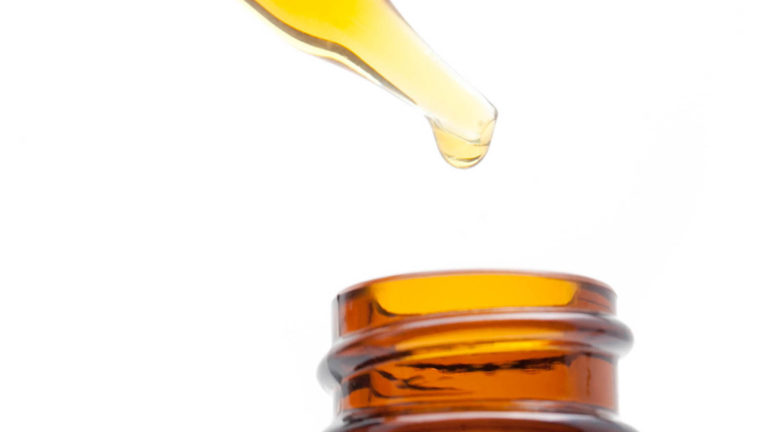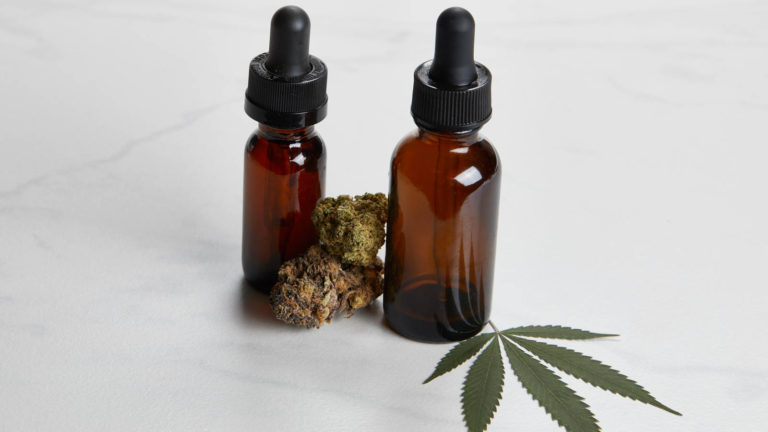Hemp-derived CBD and cannabis-derived CBD are both legal in Maine. CBD can also be used as an additive in food or beverages.
Maine passed its first cannabis laws in 1999 when it gave patients the legal right to grow medical marijuana plants. Recreational cannabis was legalized in 2016 under the Marijuana Legalization Act, but a moratorium prohibited the sale of recreational cannabis. Recent legislation has since created a framework, and recreational dispensaries are projected to open in early 2020.
At present, only registered patients can purchase cannabis products, such as cannabis-derived CBD, from state dispensaries.
What is CBD?
CBD is a non-intoxicating cannabinoid found in cannabis and the second-most prominent in the plant after THC, which is mostly responsible for producing an intoxicating high. CBD can be sourced either from marijuana or hemp plants and has a wide range of potential therapeutic benefits.
 Photo by: Gina Coleman/Weedmaps
Photo by: Gina Coleman/WeedmapsImage lightbox

To date, researchers have identified a number of potential applications linked to CBD, including anti-inflammatory, analgesic, anti-anxiety, and anti-seizure properties. Further, the chemical has shown promise in treating numerous health conditions, including seizure disorders, mood disorders such as depression, anxiety, and psychosis, chronic pain, and many more.
Most raw cannabis strains on the market today contain small amounts of CBD, especially compared with THC. But since the cannabinoid has gained considerable attention for its wide range of purported therapeutic benefits, more high-CBD strains have recently been cultivated.
Why is CBD sometimes illegal?
All types of cannabis, including hemp strains that don't produce enough THC to cause intoxication, were considered illegal under the Federal Controlled Substances Act of 1970. The law categorized all cannabis as Schedule 1, which defined the plant as a highly addictive substance with a high potential for abuse and no accepted medical use.
The 2018 Farm Bill re-classified hemp as an agricultural commodity and made its cultivation federally legal. Further, the act removed some forms of cannabis from Schedule 1 status by creating a legal distinction between hemp and marijuana. Hemp is cannabis with less than 0.3% THC, and marijuana refers to cannabis with more than 0.3% THC. This distinction in federal law effectively legalized CBD that is derived from cannabis with less than 0.3% THC, as long as it has been cultivated according to federal and state regulations.
The 2018 Farm Bill legislation does not mean that CBD derived from hemp is universally legal throughout the United States. According to the Farm Bill, the Food and Drug Administration (FDA) has the power to regulate CBD product labeling, including therapeutic claims and the use of CBD as a food additive.
The FDA has declared that hemp-derived CBD may not legally be added to food and beverages, or marketed as a dietary supplement. Although the organization has begun to re-evaluate some of its stances on legal CBD products, the FDA has not revised its regulations. The agency also has been strict in its position against any labeling that could be perceived as a medical claim about CBD.
In addition to the federal regulation of CBD, the Farm Bill also gave states the option to regulate and prohibit the cultivation and commerce of CBD. States may regulate CBD in food, beverages, dietary supplements, and cosmetic products independently, even before the FDA finalizes its policies. Maine has created its own regulations with respect to the use of CBD in food and food products.
Maine CBD laws
The cultivation of industrial hemp was legalized in Maine in 2009 under LD1159. In February 2019, the state passed additional legislation, LD 630, providing further regulations for the licensing of industrial hemp and the sale of hemp-derived CBD.
LD 630 aligns with the federal definition of hemp as containing 0.3% concentration of THC or less. According to the law, any hemp cultivated, manufactured, or sold within the state must be licensed with the Department of Agriculture, Conservation, and Forestry (DACF). The legislation also explicitly states that foods and food products containing hemp or CBD can be sold and marketed for non-pharmaceutical purposes. These products cannot make therapeutic claims, however, unless approved by federal law.
CBD sold in Maine must meet labeling standards.
- All labels must include the ingredients, the amount by weight, and the name, address, and zip code of the manufacturer.
- Labels must not include any health claims, including that hemp, CBD, or the product can diagnose, treat, cure, or prevent any disease, injury, or condition.
- If a food product containing CBD is sold in a restaurant, the menu must clearly state the inclusion of CBD and the weight by item.
Cannabis was legalized in 1999 for medical purposes under An Act to Establish the Maine Medical Marijuana Act. Cannabis was legalized for adult use in 2016 under the Marijuana Legalization Act.
Similar to many states with recreational cannabis legislation, the commerce of recreational cannabis was placed under moratorium to allow time to develop regulations. In June 2019, Gov. Janet Mills signed LD 719 that sets up a framework for the sale of adult-use marijuana, which should become available for retail in early 2020. Until then, CBD derived from cannabis is only available to purchase from state-licensed dispensaries by patients with a medical marijuana card.
Licensing requirements for CBD
Hemp licensing in Maine is handled by the Department of Agriculture, Conservation, and Forestry. Applicants must complete their license application between January 1 and April 1 of the year they wish to grow hemp. Applicants must also submit a $100 application fee with their application. If the application is approved, licensees are also responsible for a $500 licensing fee and an additional fee of $50 per acre. Applicants must provide detailed information regarding the boundaries and dimensions of proposed growing sites.
Under Maine law, all industrial hemp must be planted using a certified seed source. These sources must be certified by the Association of Seed Certifying Agencies or another approved standard. Seeds must also come from plants that were tested during the active growing season and found to produce industrial hemp with 0.3% THC content or less.
All hemp licensees must also submit crop samples for testing. The inspection, sampling, or testing of hemp crops can happen at any time the department deems necessary (although licensees are notified prior to inspection). Licensees must allow full and unrestricted access to the crop, and all plants will be tested for THC content. If any crops test above the THC limit of 0.3% percent, they must be destroyed.
 Photo by: Gina Coleman/Weedmaps
Photo by: Gina Coleman/WeedmapsImage lightbox

Currently, all hemp in the state of Maine must be grown outdoors, although the state is currently working on regulations surrounding the cultivation of indoor hemp.
Maine CBD possession limits
There are no possession limits for hemp-derived CBD, CBD oil, or other CBD products.
Although there are no possession limits specified for CBD derived from cannabis, there are limits for cannabis possession. Individuals can possess up to 2.5 ounces. For those found with quantities in excess of this limit, Maine adheres to a tiered system of penalties.
Where to buy CBD in Maine
Hemp-derived CBD products, including CBD oil, can be found in a variety of retailers in Maine. Because the state allows CBD to be used as a food or food additive, grocery stores, restaurants, and other food-centric retail stores also sell CBD products.
 Photo by: Gina Coleman/Weedmaps
Photo by: Gina Coleman/WeedmapsImage lightbox

In addition, you can also shop for CBD online and find verified CBD brands on Weedmaps. It's vital to do your research and ensure you're purchasing CBD oil or other CBD products from a reputable source — whether that's an online retailer or a brick and mortar location.
Reputable brands will generally provide you with essential product details, including the form of the CBD (such as oil, capsules, topicals, tinctures, etc.), the quantity of CBD the product contains, other chemicals or ingredients present in the product, and more.
Cannabis-derived CBD can only be purchased from a state dispensary with a medical marijuana card.
How to read CBD labels and packaging
The 2018 Farm Bill shifted the oversight of hemp and hemp-derived products from the U.S. Department of Justice (DOJ) to the U.S. Food and Drug Administration (FDA). The FDA does not presently allow CBD-infused food, drinks, or dietary supplements to be sold, and hasn't yet provided regulations for hemp-derived CBD products.
Still, the agency warns that regulations in flux still require companies to make legitimate claims on their labels. Buyers should nonetheless approach CBD products with caution. A CBD product should clearly state what kind of CBD is used.
Full-spectrum CBD oil means the extract contains cannabis-derived terpenes and trace amounts of cannabinoids such as THC. Broad-spectrum also includes other cannabis compounds but has had THC removed during the processing phase. CBD isolate is a pure crystalline powder containing only CBD.
As mentioned, Maine has its own labeling regulations for CBD products. However, most reputable CBD producers generally include the following information on their CBD product labels:
- Amount of active CBD per serving.
- Supplement Fact panel, including other ingredients.
- Net weight.
- Manufacturer or distributor name.
- Suggested use.
- Full-spectrum, broad-spectrum, or isolate.
- Batch or date code.

